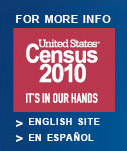
2010 is a census year, and accurate Census data is critical to CRLA's advocacy in low-income communities. Census data determines how federal dollars are distributed to local communities and spent on hospitals, senior centers, schools, road projects and other public works. Census data are also used to determine the number of seats each state has in the House of Representatives, and to enforce civil rights and prevent discrimination in voting, housing and education. It is vitally important that everyone is counted in 2010.
The Census historically undercounts racial and ethnic minorities, migrant and seasonal farmworkers, recent immigrants, renters, children and other hard-to-reach communities.
"When I saw the 2000 data for Imperial County, I couldn't believe the low numbers of children under 18," said Lupe Quintero, CRLA's Director of Community Workers based out of CRLA's El Centro office. "The difference between what the school enrollment actually is and the Census data is enormous. Parents didn't understand how to fill out the form, or the importance of listing every child. All those dollars and opportunities our schools and youth activities lost out on. We have to make a difference in 2010."
CRLA, in partnership with the two regional Census Bureau offices for California, is implementing a statewide education and outreach initiative. We are providing cross-cultural training to community-based organizations and activists, local service providers and Census Bureau staff, in order to ensure that all rural communities are informed and counted in the 2010 Census. New American Media, the Census Bureau and CRLA have produced a free DVD available in multiple indigenous languages to educate hard-to-count communities about Census participation.
CRLA Community Workers, like Quintero, are educating low-income workers and families throughout the state about Census 2010. Quintero recently spoke to a group of seniors on how to fill out the form. There was a great deal of confusion over the difference between "household" and "family". Yolanda Rios, a Community Worker in Oceanside, has partnered with another non-profit to incorporate Census information into its food service program. "It's a great feeling to be able to feed day laborers and migrant workers who are struggling and sometimes go days without eating. Bringing them food to eat is a good way of sparking their interest to read the census info and to listen to my short presentation," said Rios.
Using our existing staff and community contacts, CRLA is improving the visibility of marginalized communities, and ensuring a more accurate Census count that results in more equitable public funding and services, this work is supported in part by The California Endowment and The Irvine Foundation.
Learn more about CRLA Census Outreach
Help Support Low-Income Rural Communities


